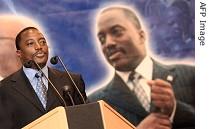In the Democratic Republic of Congo, President Joseph Kabila has sealed another alliance before a second round vote October 29 against former rebel leader Jean Pierre Bemba.
Nzanga Mobutu called on members of his party to vote for Mr. Kabila in the run-off vote. He said it was part of a deal to allow the Union of Democratic Mobutists to play a key role in Mr. Kabila's post election government.

President Joseph Kabila speaks at signing of accord between his party, AMP (Alliance for the Presidential Majority), and UDEMO party (Union of Democratic Mobutuists)
Mobutu came in fourth in the first round, with nearly five-percent of the vote. He did well in western areas where Mr. Kabila did poorly. He had previously announced his backing of Mr. Kabila but had not explained the details.
Nzanga Mobutu is the son of former long-standing ruler Mobutu Sese Seko who was overthrown by President Kabila's father, Laurent Desire Kabila.
Mr. Kabila, who was installed as president after his father was assassinated, said the deal marked a new era of partnership rather than individual divisions.
He also said it put an end to discussions of an east and west divide.
Mr. Bemba got just 20 percent in the July 30 first round to Mr. Kabila's nearly 45 percent, but their votes were clearly split along geographic lines. Mr. Kabila won nearly all votes in the east.
Opponents of Mr. Kabila allege he is not Congolese, and not even the son of Laurent Desire Kabila, charges that are repeatedly denied by the presidential camp.
Whatever his origins, the current transitional president has also gotten the support of third place first round finisher Antoine Gizenga, in exchange for a prime minister's post in case of victory. Like Mobutu, Gizenga is from the west.
Mr. Bemba, a vice-president in the current government, is getting the support of many youths who boycotted the first round saying it was tilted in Mr. Kabila's favor. Supporters from the two camps have clashed repeatedly in the first few days of the short second-round campaign.
Meanwhile, the European rapid reaction force, EUFOR, which is helping the U.N. peacekeeping force, says it will resume flying drones, after determining the most recent crash of one of these drones was an accident. These will help monitor possible troop movements of the rival camps, which continue to have their own private guards.
The October 29 election is aimed at ending decades of misrule, corruption, and war in the large, mineral rich, but impoverished Congo.
Related articles
- • Felix Tshisekedi Sworn In as DR Congo President (January 24, 2019)
- • Constitutional Court Declares Tshisekedi Winner of Presidential Election (January 19, 2019)
- • Felix Tshisekedi Vows to Be the President of All Congolese (January 10, 2019)
- • Felix Tshisekedi Elected DR Congo President (January 10, 2019)
- • DR Congo Delays Results of December Election (January 6, 2019)
- • Botswana Urges Joseph Kabila to Step Down (February 26, 2018)
- • No elections in DR Congo in December without electronic voting machines: INEC (February 13, 2018)
- • US Warns DR Congo Against Electronic Voting for Delayed Election (February 12, 2018)
- • Felix Tshisekedi accuses INEC of illegally prolonging Kabila's mandate (October 24, 2017)
- • DRC Seeks Arrest of Presidential Candidate Moise Katumbi (May 19, 2016)
- • Papa Wemba Is Buried in Kinshasa (May 4, 2016)
- • Papa Wemba Awarded Highest National Honor as Thousands Pay Tribute (May 2, 2016)
- • Rights Groups: DR Congo Must Free Pro-democracy Activists (April 13, 2015)
- • Police Open Fire on Crowd Protesting Election Law Change (January 19, 2015)
- • Etienne Tshisekedi Evacuated to Belgium for Medical Treatment (August 16, 2014)
- • Kerry Calls on Kabila to Honor Constitution (May 4, 2014)
- • Kerry in DR Congo for Security Talks (May 3, 2014)
- • DR Congo Takes Chairmanship of COMESA at Summit in Kinshasa (February 26, 2014)
- • DR Congo Honors Nelson Mandela, Hero and Model for Humanity (December 6, 2013)
- • Kabila Congratulates Congo Army for Defeating M23 Rebels (October 30, 2013)
- • DR Congo Eases Process for Starting a New Business (June 3, 2013)
- • Regional Leaders Sign DR Congo Peace Deal (February 24, 2013)
- • The M23 Rebels Want to Overthrow Kabila? Nonsense (November 28, 2012)
- • Protests Against M23 Rebels, Government and UN Spread (November 22, 2012)
- • Thousands Protest M23 Capture of Goma, Turn on Government and UN (November 21, 2012)
- • DR Congo Officials Vow to Defend Goma Against M23 Rebels (November 19, 2012)
- • At high-level meeting, Ban urges political solution to crisis in eastern DR Congo (September 27, 2012)
- • US Cuts Military Aid to Rwanda Over Support to Rebels in DR Congo (July 21, 2012)
- • DR Congo, Rwanda Sign Pact to Fight Rebels in Eastern Congo (July 15, 2012)
- • Police Investigate Former Prime Minister for Corruption (May 14, 2012)







